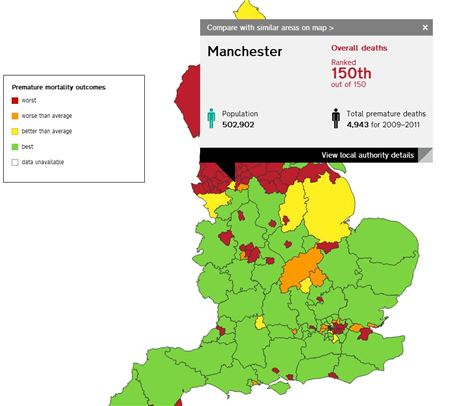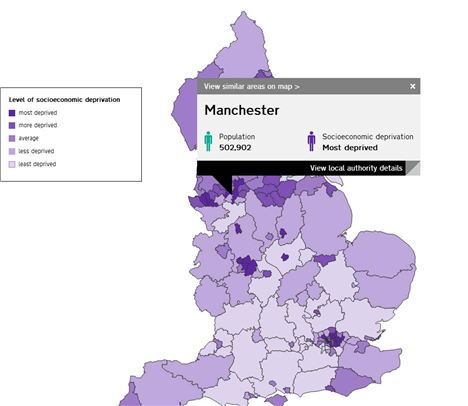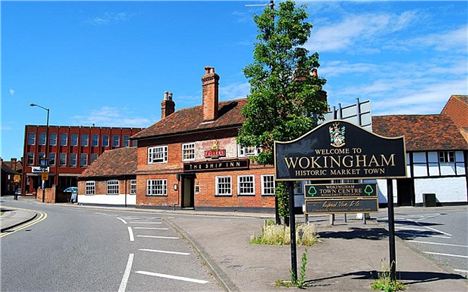THE headline ‘Dead Manc Walking’ may have had one cheeky sub from The Sun smiling all the way home, but for those living in Manchester the news that it’s the worst place in the UK for premature deaths, cancer and heart disease may have had you choking on your foot-long at lunch.
While the situation here may seem bad compared to the rest of the country, Manchester actually started from a ‘worst position’ than many other places.
The Longer Lives death map was published for the Public Health Outcomes Framework using records of deaths provided each year by the Office of National Statistics. See the map below.
Overall it shows that the north of England has a higher risk of early death than the south and Manchester is the capital of premature deaths and fatal diseases. It’s all doom and gloom in this city apparently. Or is it?
Of course, such reports do, ironically, need to be taken with a pinch of salt. As a comparison of seemingly incomparable cities, according to Longer Lives, ‘premature mortality data is based on directly standardised rates’ which ‘makes allowances for the fact that death rates are higher in older populations and adjusts for differences in the age make up of different areas, enabling an accurate comparison.’
But it’s imperative that another map showing socioeconomic depravation be considered when looking at the initially alarming findings. See below.
Councillor Paul Andrews, Executive Member for Adults, Health and Wellbeing for Manchester City Council certainly won’t be losing sleep over the data.
He said: "The 'league table' format in which these figures have been presented in Longer Lives is somewhat simplistic and does not reflect the considerable strides which have already been taken in Manchester over the last decade or the strong performance of local agencies in delivering preventative activities to tackle killers such as smoking and excess alcohol consumption and improve general health.
"Regardless of what statistics are used, Manchester has been at the bottom (or very near it) of every health league table for many years. This is mainly because almost all health statistics correlate very closely to deprivation, and as one of the most deprived parts of the country it is inevitable that our health figures follow that pattern."
Due to changes made this April, such matters are now the responsibility of local authorities led by new government department, Public Health England. This new department allocates ring fenced, protected public health monies to each local authority across England (based on a per capita funding basis) for them to spend on improving public health in their specific areas, based on national and local priorities and targets.
If the Longer Lives findings are anything to go by, cancer and heart disease ought to be top of priorities and targets for Manchester. The map shows a two-fold difference in cancer death rates between the top and bottom-ranking areas (Harrow and Manchester) and a three-fold disproportion for heart attacks and strokes (Wokingham and Manchester).
Paul Nethercott is a Senior Public Health Development Adviser for coronary heart disease and cancer at the Manchester Public Health Development Service (MPHDS). His role is to develop and deliver health improvement and health awareness projects and services that aim to promote healthy lifestyles, prevent cancer and coronary heart disease, deliver education on potential signs and symptoms of these diseases, and encourage people with concerns to see their GP at the earliest opportunity. All in a day’s work.
He said: "There are many historical and complex reasons why Manchester has high rates of heart disease and cancer. These include the high level of deprivation across the city, which is a recognised indicator of poor health within the population, and the fact that many people in Manchester only access medical attention from a GP or at A&E when they are extremely ill, and ignore potential signs and symptoms.
"There are high rates of smoking and alcohol consumption and low rates of physical activity and fruit and veg consumption across the city too, and when combined, these can increase the risk of developing cancer and heart disease.
"MPHDS has a lead responsibility for improving the health of people across the city. There are many prevention and health improvement initiatives across Manchester that work to promote awareness of, and prevent the onset of cancer and heart disease.
"The rates of smoking and coronary heart disease are actually falling year on year in Manchester and while the situation here may seem bad compared to the rest of the country, Manchester actually started from a worse position than many other places, due to the historical reasons mentioned."
Initiatives by Paul and his team include the annual Be Clear On Cancer Campaign (which has led to the development of community Cancer Champions across Greater Manchester), the Manchester Active Lifestyles Service (a joint NHS and City Council project offering activities designed to improve and maintain health and fitness in venues all across the city at just £1 per person for Manchester residents), the Manchester Green Corridor Scheme which offers fourteen structured free walking routes right around the city of Manchester, the Community Food Coordinators who work in many areas across Manchester to improve food preparation and cooking skills with disadvantaged communities and groups, and the Manchester Stop Smoking Service, which helped over 5000 local people quit smoking last year. You can read more about all these initiatives here: www.gettingmanchestermoving.org
It’s all very encouraging yet the national stats seem to tell a different story, suggesting the bigger picture needs to be focused on at a national level, rather than singling out and pitting Manchester against other places in an indeterminate postcode lottery.
After all some places deemed much more affluent, such as Bedford, also have worse than average premature death rates. Plus let’s not forget England as a whole fared badly in a European league table of premature mortality in 17 countries in 2010.
Prevention rather than cure, as usual, seems key here but by targeting everyday matters rather than investing time and money in charitable sounding initiatives that don’t always hit home in impoverished areas. Think booze, fags and our food industry.
As Steven Pleasant, Lead Local Authority Chief Executive for Public Health, said: "The government has a key role to play in reducing mortality, by making changes to national policy which will influence social norms and change behaviour, including the introduction of plain packaging for cigarettes and minimum unit pricing for alcohol, which would make an enormous difference locally. Greater Manchester continues to be disproportionately affected by alcohol harm, with five out of the 10 boroughs in the top 10 most affected boroughs within England.
"We continue to work with partners in the NHS, who also play a role in reducing mortality through interventions such as screening and management of long term conditions. At the same time, the government also has a duty and responsibility to do all they can to protect the most vulnerable in our communities."
Cllr Andrews added: "We and Greater Manchester colleagues have been lobbying the Government for some time for the action that could make the biggest difference to behaviour - plain cigarette packaging and alcohol minimum unit pricing - but these were dropped from the Queen's Speech.
"Manchester's health has been improving over recent years - but not as quickly as in more affluent areas. The recent public health budget allocation formula used by the Department of Health suggests that Manchester's spend on public health has been historically low and it is to be hoped that future allocations will rectify this. Local Authorities only took on responsibilities for public health on April 1 this year, and while the council received £41 million for public health, this is still £10 million short of our target allocation based on the Government's own formula."
Ultimately it comes down to personal choices. Because it’s very easy to blame an area rather than take personal responsibility for your own lifestyle choices.
Or you could just move to Wokingham. People live longer there.
Follow Lynda on Twitter @lyndamoyo
Main image by artist, James Chadderton.







